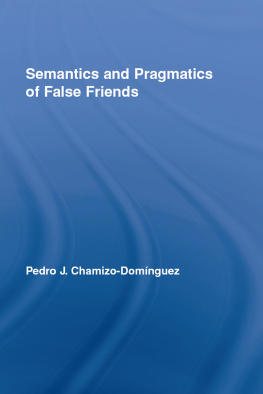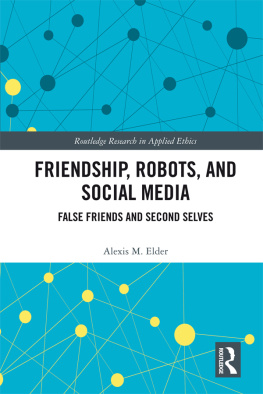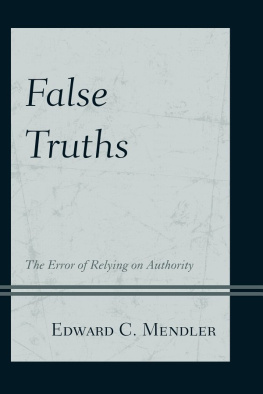Pedro J. Chamizo-Domnguez
| Routledge | Routledge |
| Taylor & Francis Group | Taylor & Francis Group |
| 270 Madison Avenue | 2 Park Square |
| New York, NY 10016 | Milton Park, Abingdon |
| Oxon OX14 4RN |
2008 by Taylor & Francis Group, LLC
Routledge is an imprint of Taylor & Francis Group, an Informa business
Printed in the United States of America on acid-free paper
10 9 8 7 6 5 4 3 2 1
International Standard Book Number-13: 978-0-415-95720-5 (Hardcover)
No part of this book may be reprinted, reproduced, transmitted, or utilized in any form by any electronic, mechanical, or other means, now known or hereafter invented, including photocopying, microfilming, and recording, or in any information storage or retrieval system, without written permission from the publishers.
Trademark Notice: Product or corporate names may be trademarks or registered trademarks, and are used only for identification and explanation without intent to infringe.
Library of Congress Cataloging-in-Publication Data
Chamizo Domnguez, Pedro J. (Pedro Jos), 1952
Semantics and pragmatics of false friends / Pedro J. Chamizo-Domnguez.
p. cm. -- (Routledge studies in linguistics ; 7)
Includes bibliographical references and index.
ISBN 978-0-415-95720-5 (hbk. : alk. paper)
1. Translating and interpreting. 2. Semantics. 3. Pragmatics. I. Title.
P306.C514 2007
418.02--dc22 2007004681
Visit the Taylor & Francis Web site at
http://www.taylorandfrancis.com
and the Routledge Web site at
http://www.routledge.com
Misunderstanding is a by-product of knowing how. Only a person who is at least a partial master of the Russian tongue can make the wrong sense of a Russian expression. Mistakes are exercises of competences
(G. Ryle, The Concept of Mind, p. 60. Original emphasis).
Contents
Acknowledgments
As is customary regarding such studies, I alone should be held responsible for any errors which may remain. Nevertheless, I should like to express my gratitude to those colleagues and friends who have contributed to its compositiongiving me suggestions, detecting mistakes and errata, providing me with texts and/or examples, or simply giving encouragement to my work. Here then let me record my thanks to them all: Wolfram Aichinger (University of Vienna, Austria), Antonio Alberte Gonzlez (University of Malaga, Spain), Keith Allan (Monash University, Australia), Daniel Buncic (University of Bonn, Germany), Marisa Cordella (Monash University, Australia), Bertha Gutirrez Rodilla (University of Salamanca, Spain), Oliver Leaman (University of Kentucky, USA), Rodrigo Lpez Carrillo (University of Granada, Spain), Lise R. Lorentzen (University of Trondheim, Norway), Anita Naciscione (Latvian Academy of Culture, Latvia), Brigitte Nerlich (University of Nottingham, UK), Salvador Pea Martn (University of Malaga, Spain), Encarnacin Postigo Pinazo (University of Malaga, Spain), Marcial Prado (University of California, Fullerton, USA), Alicia Rodrguez Sern (University of Malaga, Spain), Gustavo A. Silva (Pan American Health Organization, Washington, D.C., USA), Gerard Steen (Vrije University, Amsterdam, The Netherlands), Grzegorz Szpila (Jagiellonsky University, Krakow, Poland), Stavroula Varella (University of Sussex, UK), Andrejs Veisbergs (University of Latvia, Latvia), and Magdalena Zawislawska (University of Warsaw, Poland).
Finally, I must record my lasting gratitude to those who have generously contributed to this English version. Namely, Paterson Brown (Metalogos Project, USA), Ana Isabel Hernndez Bartolom (University of Valladolid, Spain), Gustavo Mendiluce Cabrera (University of Valladolid, Spain), and Jack Weiner (Northern Illinois University, USA).
Introduction
The topic of false friends is a linguistic phenomenon which must very frequently preoccupy both academics and foreignlanguage translators. As I will attempt to demonstrate at length in this study, such linguistic interference is the source of many errors in translation, as well as common misunderstandings occasioned when a speaker attempts to express him/herself in a language other than his/her native oneoften including those with some competence in the foreign language concerned, as the aforementioned G. Ryle's quote points out. Interest in this topic on the part of teachers of foreign languages often in fact arises after they have noticed errors which either they or their students have committed and which have given rise to misunderstandings. A good example of such entanglements is provided by R. Hill in his A Dictionary of False Friends, where he confesses his embarrass at having been confused for a long while regarding the meaning of cognates for the English adjective fastidious in the Romance languages:
Since the early 1960s, when I began teaching English as a foreign language, there has been a marked shift in emphasis in the way we teach, from detailed studies of texts, to methods which encourage the students to talk more. From the beginning, I remember noticing how the meaning of certain English words was repeatedly misunderstood: the context might offer no hint of the fact that words like sympathetic, smoking, or control meant something quite different in English from the similar word in other languages. I am ashamed too, when I think how many times I have used fastidious as a reasonable synonym for fussy before I discovered that the former was likely to be understood by all Latins (i.e. speakers of Portuguese, Spanish, French, and Italian) as irritating, troublesome, or annoying. (Hill 1982: i. Original italics).
And indeed it seems that Hill is not the only person who has been misled by this variance between English fastidious and its Romance cognates. This adjective has equally tripped up others:
Es cierto que a veces inclusive trminos similares en dos lenguas no demasiado alejadas entre s tienen sentidos diversos; recurdese la alharaca que se arm, tiempo ha, en una reunin de la Sociedad de Naciones cuando un delegado britnico dijo del discurso de un delegado de otra nacin que era fastidious. Fastidious no quiere decir fastidioso, sino algo as como muy detallado y pormenorizado. [It is certain that sometimes even quite similar terms in two closely related languages have diverse senses; one has only to recall the furore that was caused some years ago in a meeting of the League of Nations, when a British delegate called the speech of a delegate of another nation, fastidious. Fastidious does not mean (in Spanish) fastidioso (annoying), but rather muy detallado (very detailed, very thorough) and pormenorizado (exhaustive, meticulous)]. (Ferrater Mora 1970: 21; original italics)
Although both Hill and Ferrater here refer to distinct languages, it must be emphasised that this phenomenon of false friends can also occur among different dialects of the same language. Moreover, there are examples of what can be considered false friends between different dialects of one language, even when they are not found between some of these dialects and a separate language. For instance, I will allude in to the fact that the British writer Gilbert K. Chesterton was much upset when an admiring American reporter called him a regular guy. And needless to say, the pretended reporter's eulogy in American English became almost an actual injury in British English when it came to Chesterton's notice.












